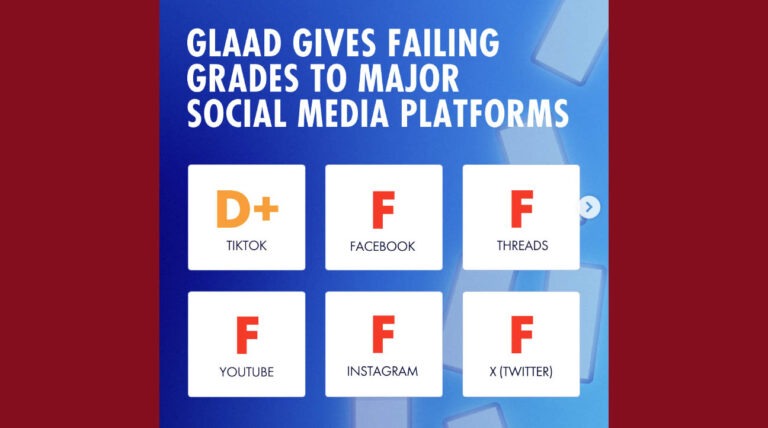The Gay and Lesbian Alliance Against Defamation (GLAAD) has released their official 2024 Social Media Safety Index. The index, one of the leading reports on anti-LGBTQ online hate and discrimination, is intended to increase safety for LGBTQ+ people according to the report’s official release.
“As we have seen over and over again, there is a direct line from dangerous online rhetoric and targeting to violent offline behavior against the LGBTQ community,” according to GLAAD.
The report analyzes various popular social media platforms based on user safety, and rates them accordingly. These Platform Scorecard ratings provide an overview of “the current state of LGBTQ social media safety, privacy, and expression, including sections on: the economy of hate and disinformation, predominant anti-LGBTQ tropes, policy best practices, suppression of LGBTQ content, the connections between online hate and offline harm, regulation and oversight, AI, data protection and privacy, and more.”
Offering specific findings and recommendations, the report calls on social media companies to urgently prioritize LGBTQ safety, especially to address the extraordinary quantities of anti-LGBTQ hate, harassment, and disinformation running rampant on their platforms. Despite score improvements from previous years, all companies fail to meet basic standards of many of the Scorecard’s 12 indicators which address a range of issues including data privacy, transparency, training of content moderators, workforce diversity, and more.
This year, X (formerly known as Twitter) earns a score of just 41%. Instagram received a score of 58%, a decrease from their 2023 score. The platform’s Community Guidelines prohibit hate, discrimination, and harassment against LGBTQ users, and it requires self-reporting. Meta on a larger scale, includes policies that protect transgender, nonbinary and gender non-confrming users from targeted misgendering, however, these incidents must be self-reported.
TikTok received a score of 67% after making several improvements to its policies. Their new “Anti-Discrimination Ad Policy” prohibits advertisers from targeting or excluding users from seeing ads based on their sexual orientation or gender identity. Despite this, the platform still falls short of total protection and equality for its LGBTQ users. GLAAD recommends the platform allow queer users more control over the content they see and asks for more transparency on the wrongful demonetization and removal of LGBTQ TikTokers. They also ask that the company track and disclose progress of meeting employment diversity goals.
Other platforms also included in the index were YouTube (58%), Facebook (58%) and Threads (51%). Many of which were asked to provide additional protections for transgender, nonbinary and gender non-conforming folks.
Additionally, the report provides data on which social media platforms have protective policies, including prohibiting “conversion therapy” content and banning targeted deadnaming and misgendering. Analyses on LGBTQ content suppression and censorship are also included, along with proposals for improvement in data protection and AI.
GLAAD continues to hold social media platforms accountable for protecting their users with their yearly index.


